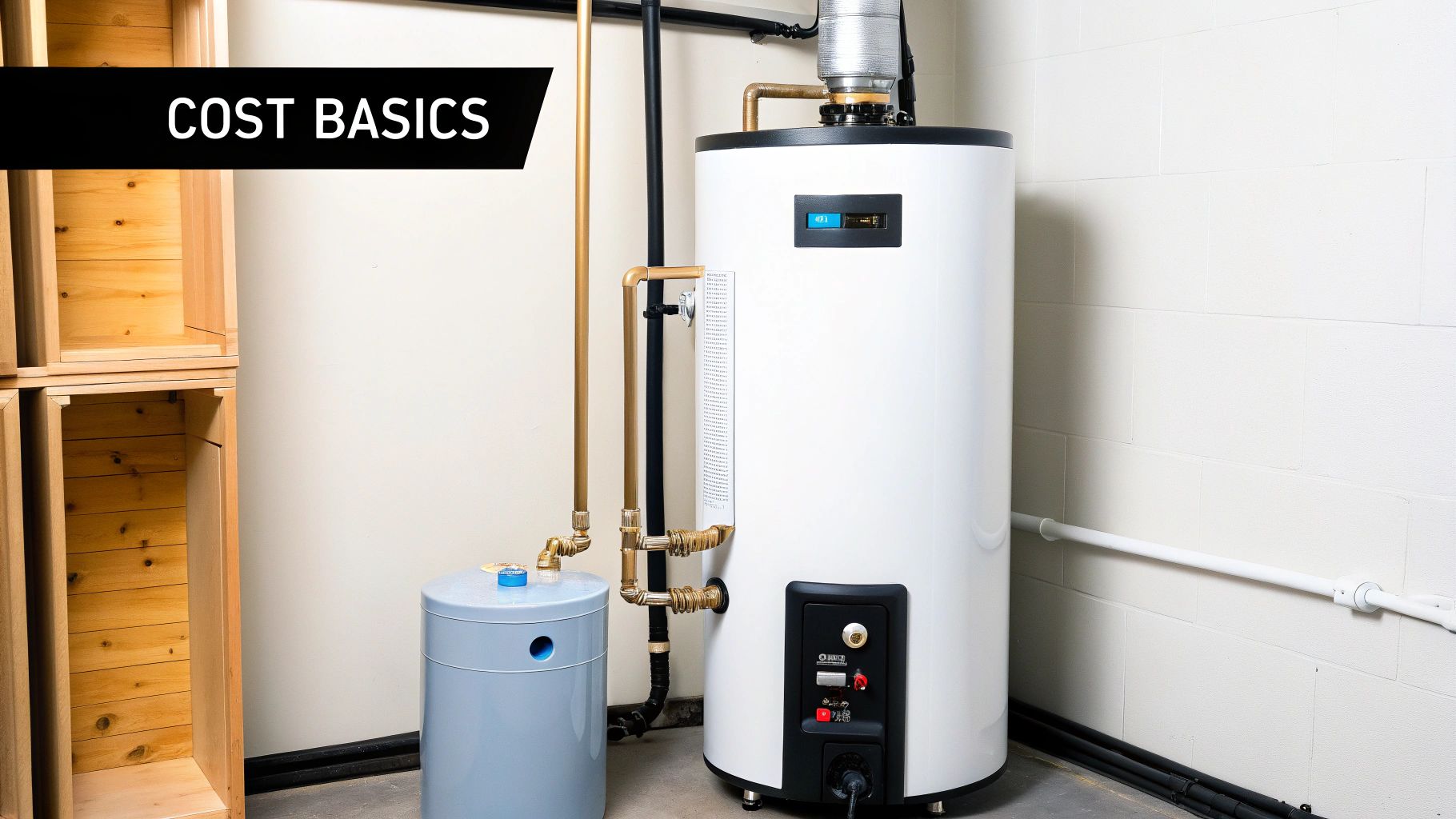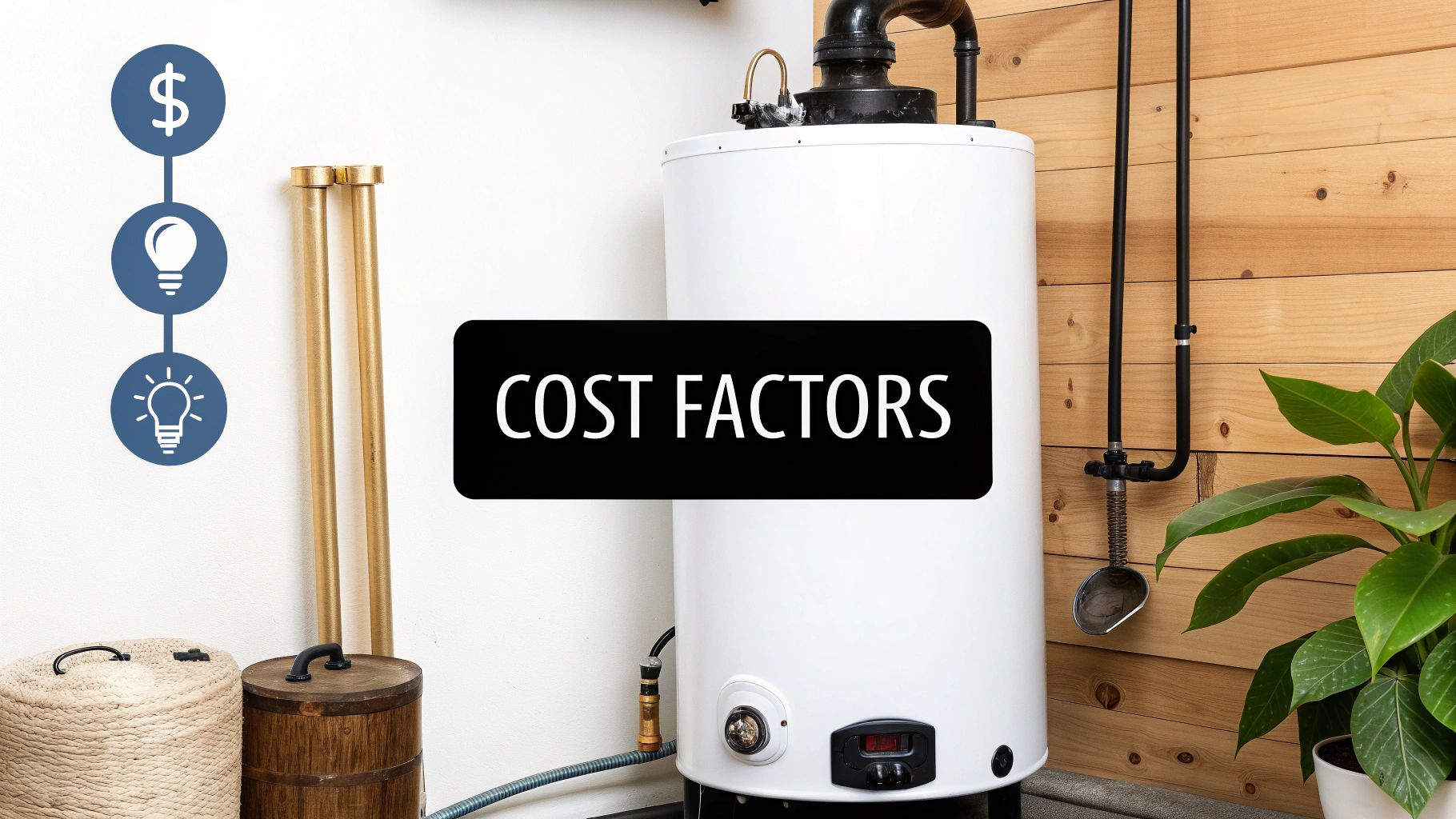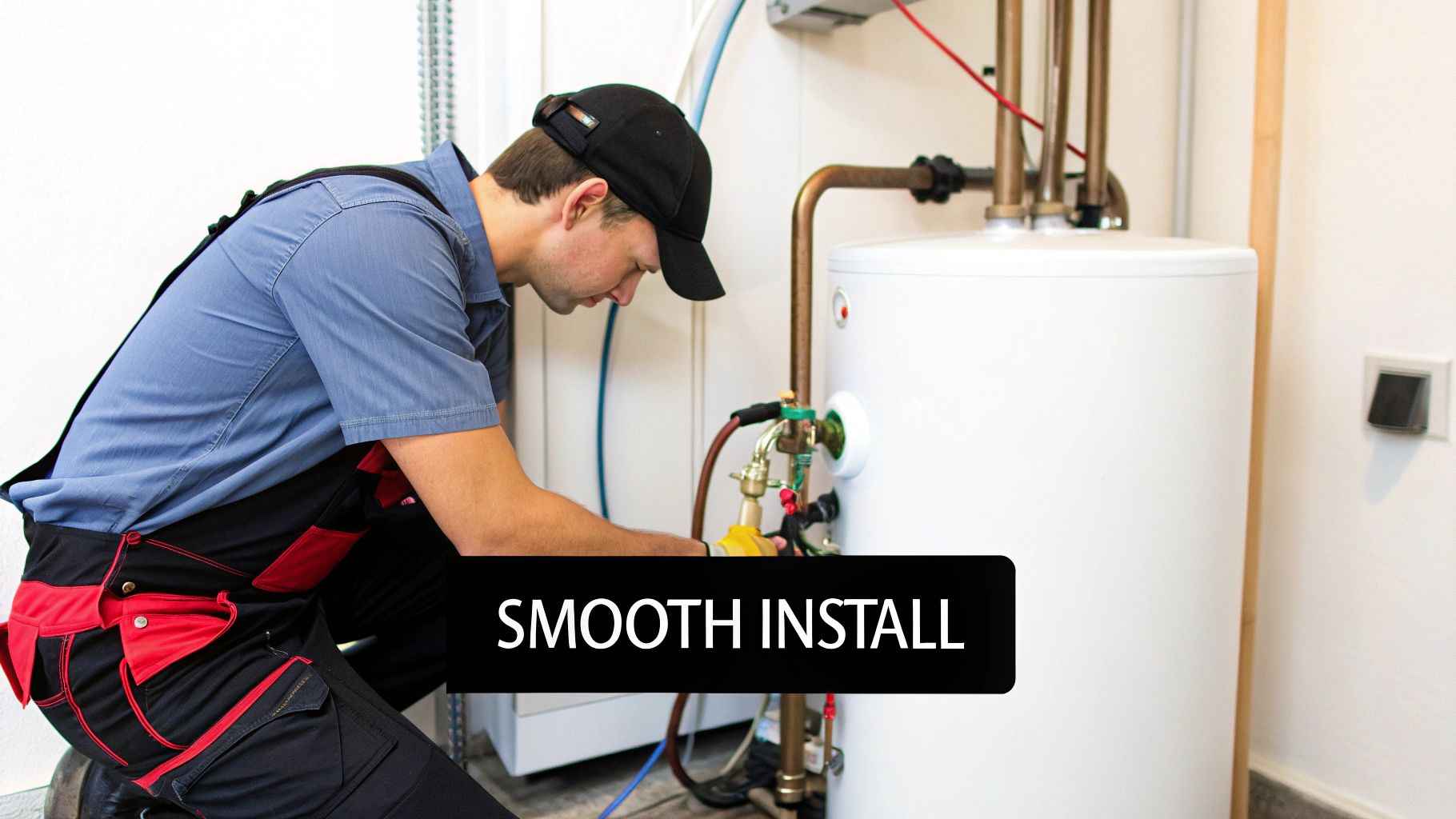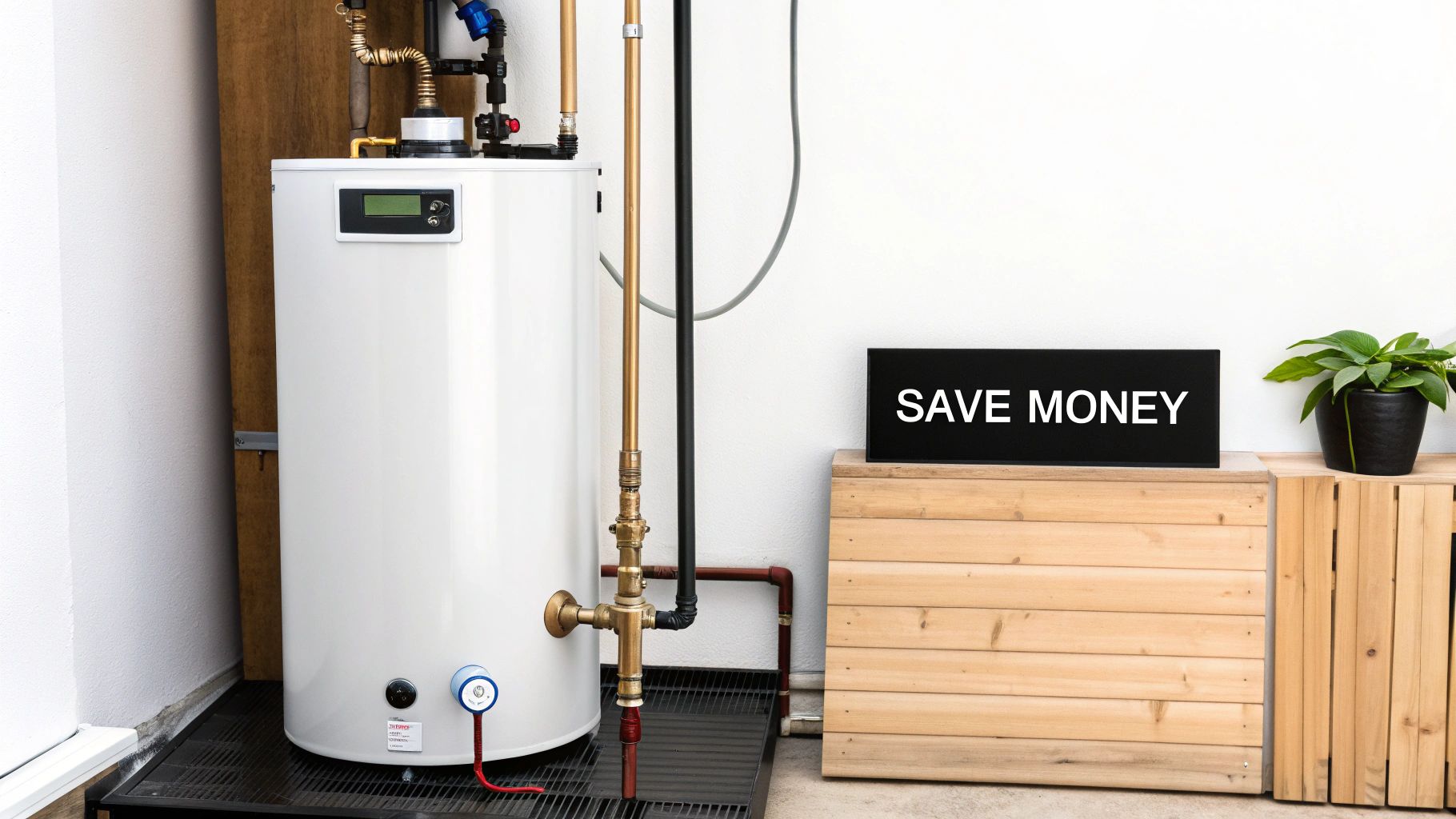The Real Cost to Replace a Water Heater: Beyond the Price Tag

Replacing a water heater involves more than simply buying a new unit. Several factors influence the total cost, and understanding these is essential for accurate budgeting and avoiding unexpected expenses. A seemingly straightforward replacement can quickly evolve into a much more involved project.
Breaking Down the Expenses
The main cost drivers include the water heater unit itself, labor costs, and additional materials. The unit’s price depends on several factors, including the type, size (such as a 40-gallon tank), and brand. Labor costs cover the installation, which can be significantly more complex for certain types of water heaters, like tankless water heaters. For instance, switching to a tankless water heater may require new plumbing and venting. Finally, necessary materials such as piping, valves, and fittings all add to the final cost.
Hidden Costs to Watch Out For
Beyond the basic expenses, hidden costs can have a substantial impact on your budget. Permitting fees are often necessary and vary depending on your location. Disposal fees for the old water heater also add to the total. Moreover, unforeseen issues, like corroded pipes or insufficient gas lines, can necessitate additional repairs and drive up expenses. These unexpected costs can sometimes take homeowners by surprise.
Understanding Price Variations
When budgeting for a water heater replacement, it’s important to recognize that prices can fluctuate widely. This variation is based on the type of water heater and the complexity of the installation. Traditional tank-style water heaters are usually less expensive upfront, with installation costs typically ranging from $600 to $2,500 depending on the tank size. However, converting to a tankless system often significantly increases labor costs because of the need for replumbing and new venting. This added complexity can almost double the installation time, resulting in a higher overall cost. Factors like household size and local labor rates also play a significant role. On average, homeowners pay approximately $1,327 for a replacement, but this can change based on individual circumstances. Learn more about water heater installation costs at Angi. Being prepared for these potential cost fluctuations is vital.
The Importance of Accurate Quotes
Obtaining detailed quotes from reputable plumbers is crucial. A thorough quote should itemize all expected costs. This includes the unit price, labor, permits, disposal, and any anticipated additional work. This transparency allows you to compare quotes effectively and helps prevent unforeseen expenses. Understanding all cost factors allows you to make informed decisions and budget appropriately for your water heater replacement.
Water Heater Showdown: Which Type Delivers Best Value?

Choosing a new water heater is a significant investment, and understanding the long-term costs associated with each type is crucial for maximizing value. Don’t just focus on the initial price tag. Consider purchase and installation costs, as well as operating expenses and potential maintenance down the line. For instance, a tankless water heater offers compact size and on-demand hot water, but its higher upfront cost and potentially complex installation shouldn’t be ignored.
Evaluating Long-Term Costs
Beyond the sticker price, factor in the ongoing cost of energy. A high-efficiency water heater might require a larger initial investment, but the energy savings over time can significantly offset this cost. This can result in lower overall expenses, especially considering that water heating accounts for a substantial portion of household energy bills. Also, the lifespan of each water heater type is a key consideration. A longer-lasting unit delays future replacements, saving you money in the long run.
One of the most significant cost factors is the heating technology used. Electric tank water heaters typically cost between $400 for a small 36-gallon unit and $750 for larger models. Gas tank water heaters are generally slightly more expensive. Tankless models offer greater energy efficiency but come at a higher upfront cost. Electric tankless models range from $400 to $700, while gas models can cost anywhere from $700 to $1,800. Hybrid electric water heaters, incorporating heat pump technology, cost between $2,000 and $3,000, but offer substantial energy savings and may qualify for federal tax credits. The best choice often depends on ongoing fuel costs; natural gas is generally less expensive than electricity. For further information on water heater replacement costs, visit Hot Water. This research helps homeowners make informed decisions about the true cost of different water heater options.
To provide a clear comparison of various water heater types, their costs, and lifespans, refer to the table below:
Water Heater Type Cost Comparison: A comprehensive breakdown of different water heater types, their upfront costs, installation expenses, and estimated lifespan.
| Water Heater Type | Unit Cost Range | Installation Cost Range | Total Cost Range | Average Lifespan |
|---|---|---|---|---|
| Electric Tank | $400 – $750 | $200 – $500 | $600 – $1250 | 8-12 years |
| Gas Tank | $500 – $900 | $300 – $700 | $800 – $1600 | 8-12 years |
| Electric Tankless | $400 – $700 | $500 – $1000 | $900 – $1700 | 20+ years |
| Gas Tankless | $700 – $1,800 | $800 – $1,500 | $1500 – $3300 | 20+ years |
| Hybrid Electric | $2,000 – $3,000 | $500 – $1,000 | $2500 – $4000 | 10-15 years |
Note: Installation costs can vary significantly based on location and complexity of the installation.
As the table highlights, while tankless and hybrid options have higher initial costs, their extended lifespans and energy efficiency can lead to long-term savings. Traditional tank water heaters offer lower upfront costs, but require more frequent replacement.
Hidden Costs and Considerations
When budgeting for a water heater replacement, be aware of potential hidden costs. These might include necessary upgrades to your existing plumbing or electrical systems. For example, switching to a tankless water heater might require larger gas lines or upgraded electrical circuits. Maintenance costs also vary between water heater types. Some require more frequent servicing than others, which adds to the overall expense. For related articles, you can check our sitemap.
Choosing the Right Water Heater for Your Needs
The best value water heater is ultimately the one that best suits your specific needs and circumstances. Factors like household size, hot water usage patterns, and local energy costs all play a role in determining the optimal choice. A larger family with high hot water demand might benefit from a tankless or hybrid system despite the higher upfront cost, thanks to the long-term energy savings. A smaller household with moderate hot water usage, on the other hand, might find a traditional tank water heater the most cost-effective option. Carefully weigh these factors to make a decision that aligns with both your budget and your lifestyle.
Gas Water Heater Replacement: The Complete Cost Picture
Replacing a gas water heater is often more complicated than many homeowners anticipate. The final invoice can significantly exceed the initial estimate, leading to frustration and budget concerns. This discrepancy usually arises from a misunderstanding of what a full replacement entails, compared to simply swapping out the unit. Let’s explore the factors that contribute to the overall cost.
Understanding the True Cost of Gas Water Heater Replacement
A basic swap assumes your current setup meets modern safety and efficiency codes. However, particularly in older homes, this is rarely the case. Outdated venting, for instance, might require an upgrade to handle a new, high-efficiency water heater. This could involve replacing vent pipes and fittings, which adds to both material and labor expenses.
Gas line modifications may also be necessary. If the existing gas line isn’t the right size for the new water heater’s BTU (British Thermal Unit) requirement, it will need to be upgraded. This can be a significant job, requiring specialized skills and potentially increasing the project’s complexity and overall cost.
Essential safety measures further contribute to the expense. Current gas water heaters have stricter safety standards than older models. This frequently necessitates the installation of new shut-off valves, pressure relief valves, and other safety devices. These components add to the overall cost but are vital for safe operation.
The average cost to replace a gas water heater ranges from $1,000 to $6,000, with labor comprising roughly half of that amount. Materials can cost between $500 and $3,500, influenced by factors like the type of water heater (traditional tank, tankless, or hybrid). The size of the unit, whether a 30-gallon tank or a tankless model with a specific flow rate, also impacts both unit and installation costs. Even the water heater’s location in your home can influence labor costs, with harder-to-access areas increasing expenses. Homeowners might qualify for tax credits by choosing energy-efficient models, which can offer long-term savings. Learn more about gas water heaters at Modernize.
Deciphering the Invoice: Where Does Your Money Go?
Examining actual invoices reveals the broad range in replacement costs. A $1,200 installation usually indicates a simple swap with minimal extra work. This typically involves disconnecting the old unit, installing the new one, and connecting existing plumbing and gas lines. Conversely, a $5,000 installation typically signals a more involved project.
Essential Upgrades vs. Unnecessary Upsells
Not all upgrades are equally beneficial. Some, such as upgrading to a correctly sized, energy-efficient water heater, offer significant long-term value through reduced energy bills. Others, however, might be unnecessary upsells. For instance, a salesperson could recommend a larger-capacity water heater than you require, unnecessarily increasing the cost.
To avoid overspending, carefully evaluate your hot water needs and discuss your options with a qualified plumber. A reputable plumber can assess your current system, suggest appropriate upgrades, and provide a clear breakdown of all costs. This ensures you invest in needed improvements and avoid unnecessary expenses. Understanding these cost factors enables you to make informed decisions and prevent unexpected financial burdens during your gas water heater replacement.
Installation Costs Decoded: What You’re Really Paying For

That labor charge on your water heater quote isn’t simply about swapping out the old unit. It covers a range of essential services ensuring your new water heater operates safely and efficiently for years to come. Understanding these components helps you evaluate the fairness of installation quotes and recognize the value of professional expertise.
Beyond the Wrench: Key Labor Components
The installation process involves more than just connecting pipes. A qualified plumber assesses your current setup—water lines, gas lines (for gas heaters), and electrical connections (for electric heaters)—to ensure compatibility with the new unit. This assessment is crucial for identifying potential problems before they escalate into costly repairs.
Code compliance is also paramount. Local building codes dictate specific requirements for water heater installations, covering aspects like venting, drainage, and safety features. A professional installer, familiar with these codes, ensures your new water heater meets all regulations, preventing safety hazards and potential fines.
For example, older homes may require venting upgrades to accommodate modern high-efficiency water heaters. This might involve replacing vent pipes and fittings, adding to the overall labor cost. These upgrades are essential for safe and efficient operation. Similarly, gas line modifications might be necessary if the existing line is inadequate for the new water heater’s BTU demand.
The Price of Expertise: What Sets Professionals Apart
Choosing a budget installer might seem appealing initially, but it can lead to costly problems later. Improper installation can compromise safety, reduce the lifespan of your water heater, and even void the manufacturer’s warranty. Prioritizing upfront savings could result in more significant expenses down the line.
Reputable plumbers also handle tasks like removing and disposing of your old water heater. This involves disconnecting the unit, draining any remaining water, and transporting it for proper disposal, contributing to the overall labor expense. The total cost to replace a hot water heater in early 2025 is estimated between $1,560 and $1,811 per heater. This includes materials, labor, and basic supplies for a standard replacement. For a basic 40-gallon gas water heater, the retail price ranges from $815.61 to $916.91, with comparable labor costs under favorable site conditions. Disposing of the old heater adds another $28.35 to $32.25. Find more detailed statistics here.
Location, Location, Location: Accessibility and Its Impact
The accessibility of your water heater’s location also affects labor costs. If the unit is in a cramped space, like a crawl space or attic, it requires more time and effort for the plumber to complete the installation. This added complexity results in higher labor charges.
Necessary upgrades, such as replacing corroded pipes or upgrading electrical wiring, also influence the final cost. While these upgrades might not be initially anticipated, they are often essential for safe and efficient operation.
By understanding these factors, you can better evaluate installation quotes and make informed decisions. Choosing a qualified, reputable plumber ensures the job is done correctly, minimizing future problems and maximizing the lifespan of your new water heater.
Repair Vs. Replace: Making the Smart Financial Decision

Finding a puddle under your water heater is a homeowner’s nightmare. But before you panic and assume the worst, it’s important to remember that a leak doesn’t always mean a full replacement. Sometimes, a simple repair is the most cost-effective solution. This section will help you navigate the decision-making process and choose the best path forward.
Evaluating the Extent of the Damage
The first step is to diagnose the problem. What’s the source of the leak, and how severe is it? A loose connection is a relatively easy fix, but a rusted tank or a faulty heating element could indicate a much larger issue. For more information on various plumbing issues, you might find helpful resources in our sitemap for related articles.
The Age Factor: A Key Consideration
The age of your water heater is a critical factor in deciding whether to repair or replace. Traditional tank water heaters typically last 8 to 12 years, while tankless models can last up to 20 years. If your unit is nearing the end of its expected lifespan, replacement might be the smarter long-term investment. Repairing an older unit might offer a temporary solution, but it could lead to a cascade of future repairs.
The national average cost for water heater repair is $603, but prices can range from $90 to over $1,750. Replacing components like thermostats can cost anywhere from $20 to $400, depending on the brand and model. For detailed information on repair costs, check out this helpful resource from Angi.
Calculating the Cost-Benefit Ratio
When comparing repair versus replacement, consider the overall cost-benefit ratio. Factor in the estimated repair costs, the expected remaining life of the repaired unit, and the potential energy savings of a new, more efficient model. A high-efficiency water heater can significantly reduce your utility bills over time, potentially offsetting the initial expense.
Warning Signs: Beyond the Obvious
Beyond the obvious leaks, other signs may point towards a necessary replacement. Experienced plumbers know to look for subtle indicators like rust buildup, fluctuating water temperatures, and unusual noises emanating from the unit. These seemingly minor issues can often signal underlying problems that warrant a closer look.
Real-World Scenarios: Learning From Experience
Real-world examples demonstrate the importance of careful evaluation. In some instances, strategic repairs can extend the life of a water heater, saving homeowners considerable money. In other cases, seemingly minor fixes can quickly snowball into costly regrets. A professional consultation with a qualified plumber can provide valuable insights to guide you toward the best financial decision.
Insider Strategies to Cut Your Water Heater Replacement Cost
Replacing a water heater is a considerable investment. However, you can minimize the expense without sacrificing quality by employing a few smart strategies. These go beyond the usual advice and tap into the knowledge of industry experts and experienced homeowners.
Timing Is Everything: Strategic Scheduling for Savings
The timing of your water heater replacement can surprisingly impact the final price. Contractors often experience slower periods. Scheduling your replacement during these lulls can sometimes lead to discounts. Avoid peak seasons like fall and winter when demand, and prices, are high.
Consider scheduling in the spring or summer for potential cost savings.
Unveiling Hidden Rebates: Manufacturer and Utility Incentives
Many manufacturers offer rebates on specific water heater models. These are often overlooked but can significantly reduce the upfront cost. Additionally, utility companies frequently provide incentives for upgrading to energy-efficient models, potentially offsetting a substantial portion of the replacement cost.
Explore both manufacturer and utility programs to maximize your savings. You can find more information on different water heater models on our product sitemap.
DIY Prep Work: Reducing Labor Costs
Handling some preparations yourself can minimize labor charges. Clearing the area around your current water heater and draining the tank beforehand saves the contractor valuable time. However, avoid DIY attempts at the actual replacement unless you have plumbing expertise.
Incorrect installation can void your warranty and lead to expensive future repairs.
Negotiation Tactics: Respectful Bargaining for Better Prices
Negotiating with contractors is perfectly acceptable, but maintain a respectful approach. Focus on the overall project cost, rather than individual line items. Inquire about discounts for paying in cash or combining the water heater replacement with other plumbing work.
A positive contractor relationship benefits everyone involved.
Quality Over Savings: Never Compromise on Safety
While saving money is important, never compromise on essential quality and safety. Ensure the chosen water heater meets all local safety codes and is correctly sized for your household’s needs. A slightly higher upfront cost for a quality unit and proper installation will save you money and avoid potential hazards in the future. Cutting corners can lead to dangerous situations and costly repairs.
To help you see potential savings, we’ve compiled the following table:
Introducing the “Cost-Saving Opportunities for Water Heater Replacement” table, a comprehensive list of potential savings opportunities, including rebates, tax credits, and utility incentives. This table will help you understand how to minimize your expenses.
| Saving Opportunity | Potential Savings | Eligibility Requirements | How to Apply |
|---|---|---|---|
| Off-Season Scheduling | Up to 10% | Varies by contractor | Inquire with contractor about off-season discounts |
| Manufacturer Rebates | $50 – $300+ | Varies by manufacturer and model | Check manufacturer websites for rebate programs |
| Utility Incentives | $100 – $1000+ | Varies by utility company and model | Contact your local utility company for information on incentives |
| DIY Preparation | Varies depending on labor rates | Ability to perform basic tasks like clearing the installation area | Prepare the installation area and drain the old water heater tank |
| Negotiation | Varies depending on contractor | Willingness to respectfully discuss project cost | Inquire about discounts for cash payment or combined services |
As the table demonstrates, combining several of these strategies can significantly reduce the overall cost of your water heater replacement.
Ready to upgrade your water heater affordably? Contact Essential Plumbing and Electric today for a free consultation. We’ll help you choose the right water heater for your needs and budget, ensuring a smooth and affordable replacement process.



0 Comments